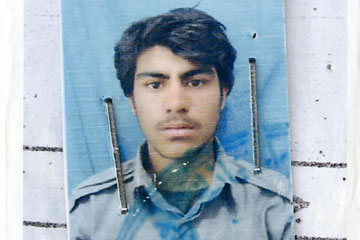
This photocopy of an image of Abdul Razaq, the killer of the three Marines, was given to the writer by a Marine in Helmand.
(10 of 12)
His detailed account of the attack resembles those of ANP, NDS and Taliban sources--and the anonymous Marine's in the Union-Tribune. But it is also scattered. At one point in the video, small-arms fire is audible in the background. The breath goes out of Abdul Razaq's sentence, and he looks surprised--but he carries on quickly. He says officers in the National Police encouraged him, and he encourages other Afghan security forces to follow his example. There are occasional flashes of anger as he references civilian casualties that "I haven't seen that by my own eyes." But: "I heard ... and that was the reason I decided to kill the foreigners."
No one can fight a war without a story. In Puzeh, the American story has been Village Stability Operations, and the Taliban interviewer's final question for Abdul Razaq is what he thinks of its centerpiece, the Afghan Local Police. "Infidels are giving them lots of ammunition and weapons and send them on patrol in the villages, and they oppress their own villagers," he answers, "and the infidels will be gone the next day. So what will you do, local police?"
"My dear brother warrior Abdul Razaq," says the interviewer, wrapping up, "Thank you very much."
The word from which warrior is translated--ghazi--is complex. It means "one who kills an infidel but survives" and is usually understood in comparison with a martyr, who does not. It is a major honorific, much more than sahib (loosely mister), by which the interviewer has addressed Abdul Razaq throughout the interview. It is likely that before he killed the Marines, no one called him that, either.
It is also likely that before Captain Manoukian was a Marine, no one ever called him Haider. Just Matt. Fearsome at defensive end on Friday nights while his town barbecued by the end zone, but smiling off the field. He worked at Blockbuster in high school, drove a delivery truck in college, lost to his younger brother at beer pong and never quite lived it down. He had a steady girlfriend and parents whose sadness rolls over them like a black sea. From the "personal philosophy" he submitted with his application to law school: "I believe that through law I will be better able to help my community and society. I have seen despair and hopelessness that festers in lawless societies."
Captain Haider was accepted by Golden Gate University but deferred in favor of his last deployment. I visited his family, who insisted that the other deceased Marines receive equal attention. I contacted their families too. On the phone, one of the fathers told me he knew the bones of what had happened but said, "There's nothing official. No official story's been given to me ... They keep us mostly in the dark."
The usual story about fallen Marines is one of quiet heroism, and its core is simple: the Marines go to Afghanistan, help the Afghans. There is no room for talk of "the politics." As though service in the Marine Corps--the actual fighting of wars--is somehow distinct from complex political thought. The Marines who negotiated with the elders of Puzeh probably knew better. Whether or not it is a Marine's moral responsibility to think critically about the war he fights is, maybe, a separate issue.
